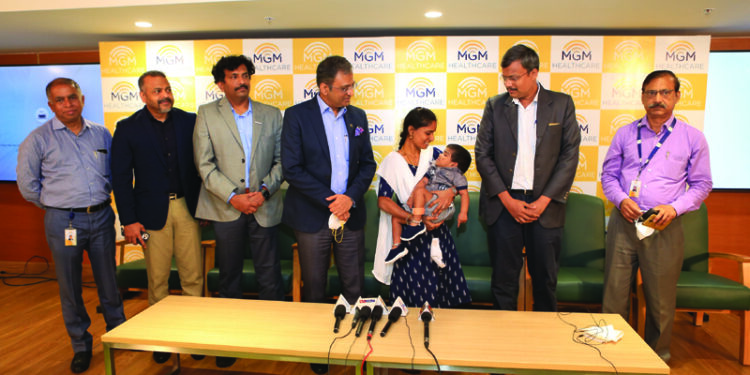R ARIVANANTHAM
CHENNAI, JULY 15
A 16-month-old-infant suffering from ‘frequent fits’ was given a fresh leaf of by a 15-member team of doctors led by Sridhar K Director and Group Head, Institute of Neurosciences & Spinal Disorders, MGM Healthcare on April 9, 2021.
A rare surgery was conducted on the infant who was suffering from ‘‘uncontrolled seizure attack (frequent fits)’’ from the early 3 months, announced Sridhar K, Director, MGM Healthcare, a leading multi-specialty quaternary care hospital here on Thursday.
Addressing a virtual media meet, Dr. Sridhar said, “Master Jai Prajith, a 16-month-old toddler from Chennai started having seizures from almost the time he was born and this problem only got worse within the next few months.”
Elaborating on the surgery, Sridhar said, “Our Neurosciences, Pediatric Neurology team had discussed the problem and findings with the infant’s parents. We informed them that a surgery could be performed which would stop the spread of the seizures from one side to the other side of the brain and therefore it would reduce the attacks. It was a difficult situation as the child’s brain was not properly developed and also had structural issues by birth. After multiple sessions of discussion with us, the parents gave their consent for the surgery. The surgery – Anterior Corpus Callosotomy is a rare procedure to be performed on children so small. As this was the only option available to help the child, the surgery was performed. It involves going between the 2 halves of the brain, delicately separating them and then dividing the connecting nerve fibres. This was done under high magnification and we had continuous recording of the EEG done during the surgery.”
He further added, “As the sectioning was completed the EEG showed reduction in the seizure spikes. It was an encouraging sign for us as it showed us that we were on the right track”.
In reply to a query, Dr Sridhar said that the deformity is not common, but it can be curable if it is properly diagnosed and operated at an early stage.
Dr Arulmozhi, Consultant Pediatric Neurologist said, “The baby had a complicated birth history and developed severe asphyxia soon after. The child was admitted in the Neonatal ICU for 28 days and was on ventilation for 4 days. During that period he started getting episodes of seizures and by the time he turned 3 months, the infant experienced 40-50 jerks per day for which he was put on various medications. He was administered up to 4 drugs but of no avail.”
He further said, “At the age of 1 year and 4 months the child was on 5 anti-epilepsy medications but he was still experiencing 40 plus attacks per day. When Seizures or Epileptic attacks do not come under control with medications we must explore the possibility of a surgical solution. It is imperative to act quickly in children as their growing brain will be affected by continued seizures, which can result into poor development.”
Dr K Sridhar and his team evaluated the child to see if surgery could help the child. An MRI was initiated which showed that the child’s brain was badly affected by the birth asphyxia. The EEG workup showed multiple separate foci in the brain from where the seizures originated and spread to the entire brain.
Dr V Ponniah, Associate Director, INSD, said, “Anesthesia of infants like Jai Prajith undergoing major surgery like this is always a challenge. More important, after the surgery the baby has to be monitored in the Neuro ICU with utmost care.”
Master Jai’s parents, who were present at the conference said, “We would like to thank Dr K Sridhar and his team at MGM Healthcare for giving us the confidence to go through with the surgery and for relieving our son from the uncontrolled seizure attacks. We are happy that our son has started responding to us and with the stopping of the fits will have a good brain development.”
As of today, the child is free of seizures and is on a minimal dose of 2 drugs. He is responding better and has started making eye contact with his mother which is a good sign. By controlling the attacks, the child has seen improvement in his cognitive abilities and a better quality of life for him as well as the parents. This way we are able to give the child’s brain the best possible chance of development and growth in the future, Dr Sridhar added.









